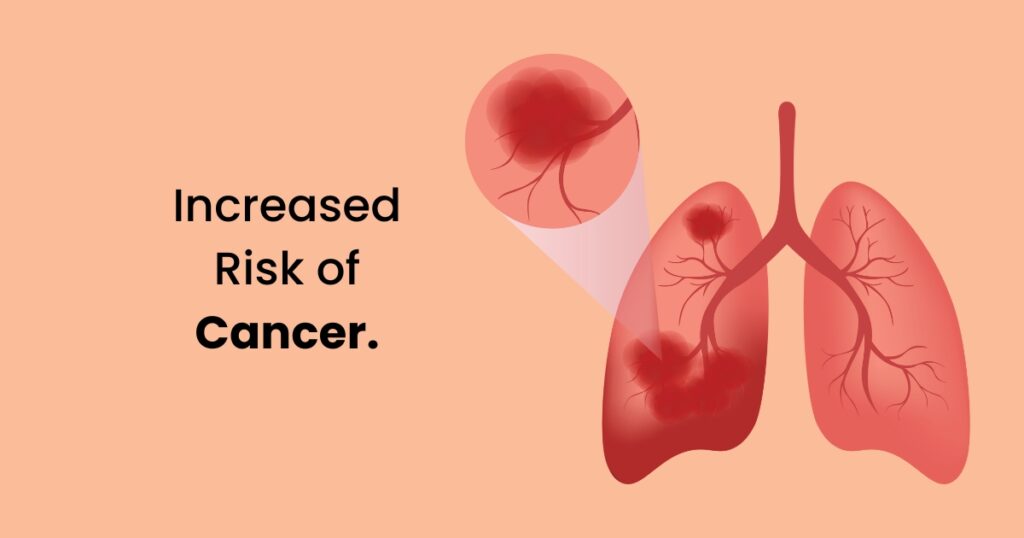Smoking remains one of the largest public health challenges around the world, killing millions each year. Consumption of tobacco although being known through and through is still a burning issue due to which the health issues are increasing drastically among us resulting in less fitness. They also have far-reaching effects on every organ in the body. Smoking and health are intimately related topics, so you must understand how smoking affects your health and subsequent fitness.
Respiratory System Damage
The respiratory system is affected first but also do its damage the fastest and hardest. Cigarette smoke consists of thousands of damaging compounds mostly tar, carbon monoxide and nicotine become inhaled inside the lung area. These substances slowly create irritation and harm to the fragile linings of the respiratory system. This can cause chronic obstructive pulmonary disease (COPD) as well as emphysema and chronic bronchitis which all seriously impede the normal function of the lungs making it hard to breathe. With it often comes an overall loss of lung capacity, making physical activities like running or even walking more difficult.
Cardiovascular Health
Cigarette smoking is a major risk factor for cardiovascular diseases like heart attacks, stroke hypertension etc. Cigarette smoke increases the heart rate and blood pressure as well due to nicotine, and it causes extra work on our hearts because of carbon monoxide. Atherosclerosis, in turn, causes the arteries to become hard and narrow which may lead to decreased blood flow to top organs. Smoking causes blood cells to stick together, forming clots that can deliver a fatal blow by blocking an artery. Reduced oxygen delivery also negatively impacts muscle and exercise tolerance, which makes it more difficult to engage in a healthy lifestyle that involves physical activity.

Reduced Physical Fitness
Smoking affects physical fitness on a direct level because it damages the body’s ability to effectively use oxygen. Carbon monoxide in the bloodstream lowers the amount of oxygen that can be carried by red blood cells, diminishing muscular delivery during exercise. Which leads to reduced physical performance, stamina and endurance. This causes a lot of smokers to become tired quickly during physical exercises, so it is hard for them to go jogging or play sports. Smoking has an impact throughout your body and over time can lead to loss of fitness which will make it harder for you to reach new exercise goals or maintain a healthy weight.
Impact on Muscular Health
Smoking also affects muscular health besides cardiovascular and respiratory one. Nicotine, a strong vasoconstrictor restricts the circulation of blood to muscles and makes them devoid of essential nutrients such as digestive juices and oxygen. When fat metabolism isn’t taking place properly, muscle function suffers and so does recovery with increased fatigue on the muscle level as well as an increase in risk for injury. Additionally, smoking has been shown to decrease muscle mass and strength — which means that smokers will have more difficulty putting on new lean tissue while keeping the old. This can be very inconvenient for people trying to increase muscle—through strength training, other physical fitness activities and influences as well.
Weakened Immune System
Smoking depresses the immune system, making you more vulnerable to an infection or illness football injuries Football players and other professional athletes put their bodies through a great deal of exertion regularly every time they take part in matches. The chemicals in cigarette smoke kill immune cells and leave them unable to fight infections. But if it’s out of balance too often, this can weaken the immune system and you may get colds more frequently, respiratory problems or find that when your body is put under pressure from a new virus infection, it takes longer to recover. And a weakened immune system also makes them more likely to suffer from complications of the disease in general, thereby compromising their overall health/fitness even further. What is more, injuries and surgeries take much longer to heal in smokers as a result of the reduced oxygen supply in their blood (strength essence) — if there are fewer nutrients delivered by this source then less repair can occur effectively.
Skin and Aging
Smoking does not only cause damage inside, it is also shown outside. Smoking is shown to increase the overall aging process causing early wrinkles, dry skin and sallow looking complexion. Because the flow of blood and oxygen to the skin is less, so there are fewer nutrients. Furthermore, the repetitive motions of smoking which include pursing the lips and squinting also contribute to wrinkles. Not to mention that smokers always have a lot of lines on the mouth and corners of their eyes, so this makes them seem older than when they are compared with non-smokers. The external signs of the impact of smoking on your health mean that it is impossible to hide from either yourself or other people, as images show changes in skin texture alongside a damaging influence internally.
Dental and Oral Health
The impact smoking has on dental and oral health is enormous. Cigarettes contain tar and nicotine that seep into the enamel of your teeth, causing them to turn yellow. Smokers are the first to receive a reduced amount of blood flow from the heart because smoking decreases and alters gum growth in smoke. However, this may result in loss of teeth from cavities or drained gums which cause the individual to own continual unhealthy breath. In addition, smoking is a major contributor to the development of oral cancers which can prove fatal if not recognized and treated at an early stage. The global effect on oral health relates not only to live expression but also due systemic diseases with which the poor oral condition is closely connected.
Cognition & Mental Health
Niacin also recovers the brain and thus reduces withdrawal symptoms. Smoking is known to trigger or exacerbate a number of mental health disorders Anxiety, Depression; illnesses; and Alzheimer’s (among others); these are almost universally comorbid with tobacco use. Nicotine addictiveness is very strong as it changes the chemistry of your brain and leads you to dependence withdrawal symptoms. Although some smokers may smoke as a way to cope with stress, the problems caused by long-term smoking can actually bring on mental health issues. Research on the subject indicates smokers have up to double the chance of later developing depression and/or anxiety disorders. Smoking also causes brain decline and a plethora of dementia conditions like Alzheimer’s. However, the mental health effects of smoking can actually make it difficult to quit is only contributing to deteriorating their overall wellness and health.
Reproductive Health
Smoking has a tremendous impact on the reproductive health of both males and females. Smoking is related to lower sperm count and decreased motility in men, it is also associated with erectile dysfunction. All of these can trigger infertility which makes it hard for couples to have a child together. For women, smoking can also lead to menstrual problems, reduced fertility and pregnancy complications. Smoking during pregnancy has been associated with increased rates of miscarriage, preterm delivery and low birth weight babies. In addition, the harmful chemicals found in cigarette smoke can reach a developing foetus and result in potential health problems for your child as they grow.

Increased Risk of Cancer
Increased risk of cancer One of the most known and worst consequences that smoking causes is an increased probability of having cancer. Smoking accounts for about 85 per cent of lung cancers But cancers of the mouth, throat, oesophagus, and pancreas — even bladder and kidney cancer along with cervical cancer are all associated with smoking as well. Carcinogens in cigarette smoke harm DNA and disrupt the controls inside cells that prevent them from becoming cancerous, which lets it become uncontrolled growth of abnormal cells. The most powerful way to prevent cancer and improve long-term outcomes is tobacco cessation.
Conclusion
The implications of smoking on health and fitness are profound, and beyond measure Smoking disrupts the respiratory and cardiovascular systems, weakens the immune system, and increases susceptibility to cancer. It is estimated that smoking affects almost every organ of our body as well as physical health including mental health (USDHHS 2020). The declining physical fitness, diminished endurance and general muscle disorder make it difficult for smokers to stay fit or meet their goals. Not to mention of course the tell-tell exterior indicators on our skin and oral health. Among those who are smokers, this is the single most important action; it has the biggest benefits in terms of improving health and fitness and prolonging life. The positive effects of quitting smoking start almost immediately and continue indefinitely, leading to better health and greater enjoyment in life.

